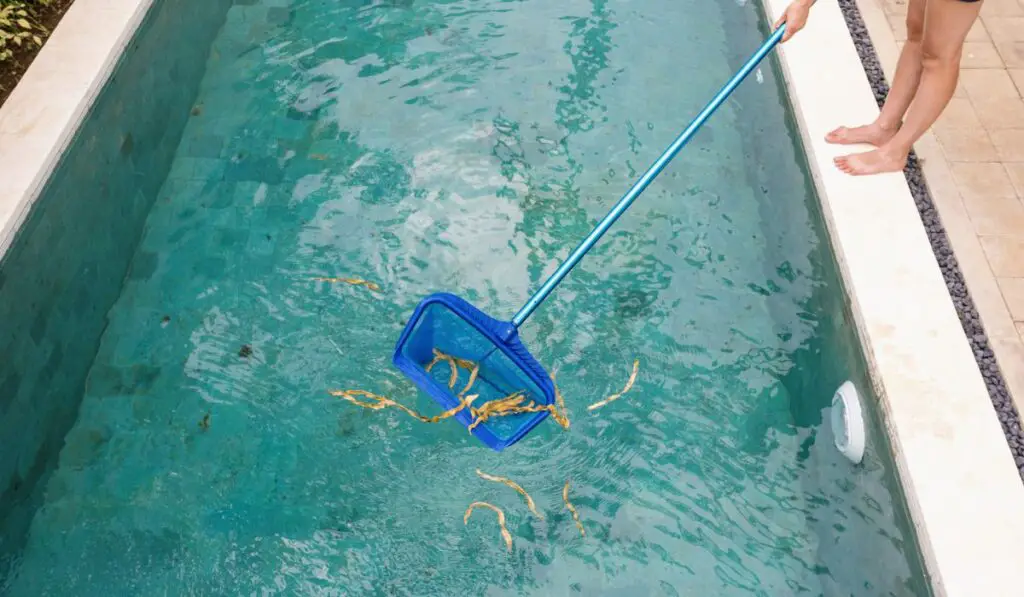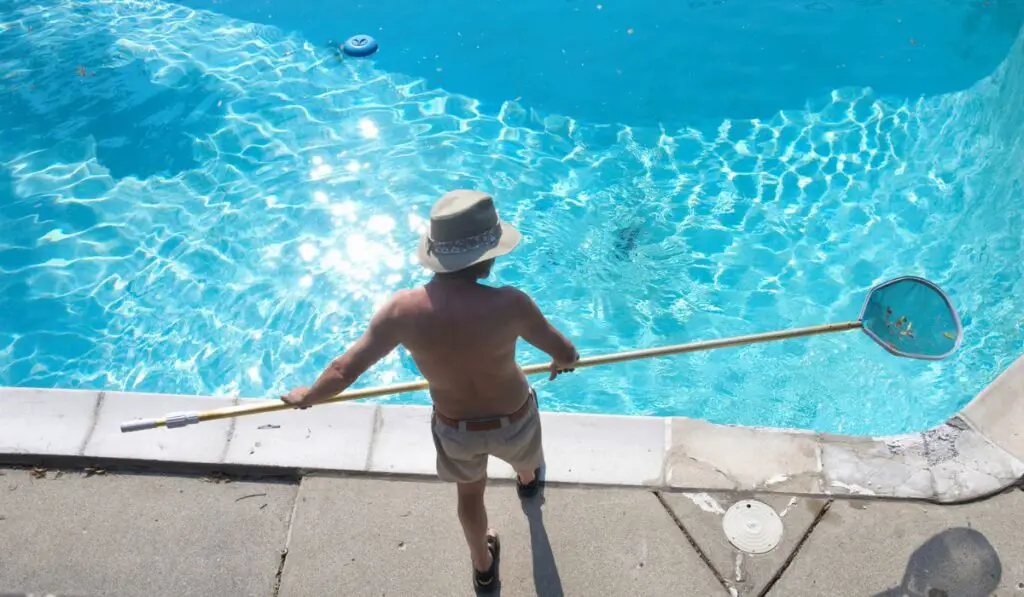Although having a pool is a great luxury, it’s also a big commitment. If someone chooses to install a pool in their backyard and then never cleans or maintains it, it certainly won’t be usable — and it could even be dangerous, which is why it’s critical for pool owners to keep up with regular maintenance.
You should clean your pool regularly, balancing the chemicals a few times a week and scooping out the debris as often as needed. You will also need to shock your pool every once in a while. Keep an eye out for signs that your pool needs attention, like algae growing or cloudy water.
As long as you keep a close eye on your pool, you should be able to keep it in great shape without too much effort. Let’s take a look at the most important steps to take to ensure your pool is safe and clean, as well as the tools you need.
How Do You Clean a Pool?

There are a few ways to keep your pool clean, and you’ll have to use all of them to keep it at its best.
Firstly, you should scoop the debris out of the water whenever necessary. If you have trees hanging over the pool, this might be as often as every day. Get a good pool net (on Amazon) and make sure you’re thorough in removing the leaves, twigs, and other items, as they can quickly build up.
If your pool isn’t under anything, then you may not have to do this as often — but it’s particularly critical to do it after heavy rain or a storm, especially if you don’t have a pool cover over the water.
You’ll also have to clean your pool filter, which involves taking the cartridge out of the water. Don’t use harsh chemicals or a pressure washer on this — instead, soak it in a cleaning solution and water, and then rinse it off before putting it back.
To keep your pool clean, you need to maintain the chlorine level and pH balance. Otherwise, bacteria can quickly build up. You can do this by using test strips (on Amazon) and then changing the level with purchased chlorine. There should be a free chlorine concentration of around 1 ppm, and the pH level should be anywhere between 7.2-7.8.
Every now and then, you might need to shock your pool if a bacteria buildup has gotten particularly intense. This involves adding far more chlorine than you usually would and then letting the levels settle before you get back in.
If you do need to shock your pool, then make sure you test the levels before allowing anyone to swim in it again. Too much chlorine can lead to a lot of irritation and even cause serious problems in someone with a respiratory disease.
Lastly, you should make sure to scrub the pool walls every now and again too. Algae doesn’t only form on the surface of the pool, but the walls can quickly get coated in grime if you don’t pay attention to them.
What Supplies Do You Need to Clean Your Pool?
It’s a good idea to have all of the supplies that you might need for pool-cleaning handy so you can grab them whenever you need them. Here are the essential supplies you need:
Chlorine
You’ll find that you frequently have to add chlorine (on Amazon) to the pool to balance the chemicals. It’s easy to find and accessible, so you don’t need to worry about getting a hold of it, but it’s always handy to keep some stocked up at home.
Swimming Pool Pole
If something falls into the swimming pool, a swimming pool pole (on Amazon) is very good to have ready. Make sure you pick a sturdy pole so that it will last for years of use.
Skimmer Net
In order to keep debris out of your pool, it’s a good idea to have a skimmer net (on Amazon). You can easily reach over and use this to scoop leaves, twigs, and trash that may have gotten into the water. Since you need to do this fairly often, a good skimmer net that will last a long time is key.
Pool Vacuum
If you want a quick way to remove small pieces of debris, having a pool vacuum (on Amazon) on hand can also be very helpful. They’re a bit more of an investment than a skimmer net and pole, but they will do a good job at sucking all of the dirt up.
Pool Brush
To scrub down the walls of your pool, you’ll need to buy a pool brush (on Amazon). These are specifically designed to gently scrape any building bacteria off the walls and keep the water safe so you have to shock it less often.
Cartridge Cleaner
Lastly, when cleaning pool cartridges, you should ensure you purchase a specialized cartridge cleaner (on Amazon). These specialized cleaners should be used so that you don’t need to use harsh chemicals on your filter and risk damaging it.
How to Find the Right Chemicals for Your Pool
It’s not difficult to find the right chemicals for your pool, and the main mistakes come from people trying to use substitutes — e.g., using bleach instead of chlorine and then not using the right amount.
The best thing to do is use the exact chemical you need (like chlorine instead of bleach that contains chlorine) or use chemicals that are specifically labeled for pool use. Make sure you also take a quick peek at the reviews of that product.
How Often Does a Pool Need to Be Cleaned?
You should be maintaining your pool often, but the specific cleaning tasks have different timeframes.
When it comes to light maintenance like scooping debris out and scrubbing the walls, you should be doing this as often as is needed. Scooping debris out may need to be done every day or you may only need to do it once a week, depending on where your pool is and what’s around it.
Pool cartridges should be cleaned around once every four weeks, though this could be more or less often depending on how busy the pool is. In the off-season, you may be able to wait a while between cleanings.
While adding chlorine should be done as necessary, shocking the pool should be done once every week or two during heavy use. This will ensure it stays clean and prevents algae from growing on it.
Signs It’s Time to Clean Your Pool

If you’ve fallen behind a bit on pool cleaning and maintenance or aren’t sure if it’s time to clean it, here are the signs your pool needs some maintenance.
Cloudy Water
For the most part, the water in your pool should be clear. If it’s cloudy, that means something has gotten into the water or the chemical balance isn’t quite right and it needs some maintenance.
Debris
If there’s obvious debris in the water — even if it’s just seemingly harmless sticks and dirt — make sure you scoop it out or use a pool vacuum to suck it up before you go swimming.
Irritation
If there’s nothing obviously wrong with the water but people are experiencing any unwanted side effects when they enter the pool, it could be a sign your pool needs to be cleaned. Signs of irritation can include:
- A runny nose or eyes
- Itching
- Red skin
- Sneezing or coughing
You shouldn’t go swimming in the pool until you’ve identified the cause and cleaned it, as this can be dangerous (particularly to those who have respiratory conditions).
Algae
Algae growing on the water or walls is another clear sign you need to clean the pool. Although the green algae that grows in pools usually isn’t toxic, it can still cause the above-mentioned irritation, and the longer it’s left to grow, the harder it will be to get rid of.
Scrub it from the walls, clean the pool cartridge, and shock the water to get rid of it.
Calcium Buildup
If you don’t maintain the chemicals in your pool, you might notice a calcium buildup on the walls, which means your pool needs attention. This will usually look like chalk, and you may see it on the floor as well.
Insects
Insects in the water could be another sign you need to clean your pool. While insects are common to see in the summer season, a significant influx of bugs could mean something is wrong.
The Final Word
Ultimately, cleaning and maintaining your pool can be a bit of work — though it’s usually very worth it to have sparkling clean and safe water.
Make sure you scoop the debris out as it appears with a net (or vacuum it up), scrub the walls, clean the filter, and shock the pool every couple of weeks, and that should be enough to keep it in great shape. You can also always hire someone to come and clean the pool for you if you don’t have time yourself.
